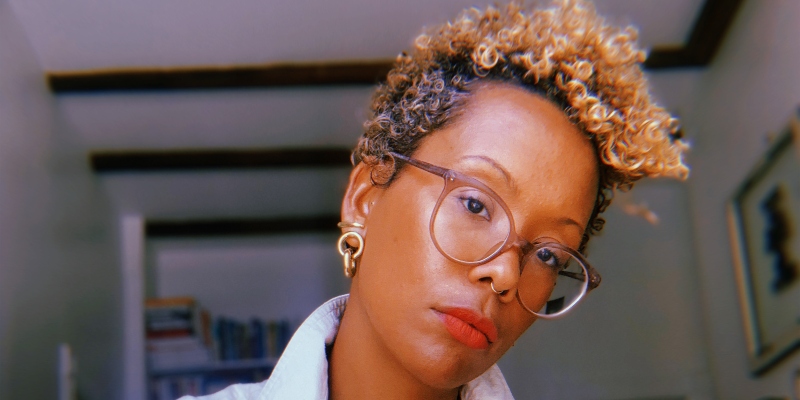
J Wortham on the Power of Changes
In Conversation with Guest Host Mira Jacob on Thresholds
This is Thresholds, a series of conversations with writers about experiences that completely turned them upside down, disoriented them in their lives, changed them, and changed how and why they wanted to write. Hosted by Jordan Kisner, author of the essay collection Thin Places, and brought to you by Lit Hub Radio.
*
In this episode, J Wortham (Black Futures) joins guest host Mira Jacob to talk about the power of changes—changing location, changing names, changing pronouns—and the space that can open up as a result of them. Plus, the differences between NYC and LA, and some love for benevolent conspiracies!
Subscribe and download the episode, wherever you get your podcasts!
*
From the conversation:
J Wortham: Not being in New York helped me ease into whatever metaphorical new set of baggy pants. There was something about being out of my rhythm and out of my life and out of the expectations. I didn’t have to work as hard to step into a new sense of self or a new way of being.
I think because LA is so sprawling and so spread out and people self-hibernate a lot, there’s a lot more spaciousness for solitude and self-identification, self-acceptance, self-knowing. I mean, I was not in LA for that long, so what I’m about to say is just a sliver of an observation. It’s a true generalization. It may not be real, just my experience.
Mira Jacob: Got you.
J Wortham: But I wondered if because LA is so sprawling and people hibernate a lot, there’s a different type of knowing that one has to have of themselves there, that is separate from New York knowing. In New York, you have to know different things to survive.
And in New York, it’s so dense and you’re always bumping into people—people you know, people you don’t know, people you want to know, people you don’t want to know—and you’re always negotiating other people. I don’t always have the luxury of time in New York to think about who I am and how I want to present and how I want to appear, because I just don’t have as much time.
Mira Jacob: Yeah, you’re in the mix.
J Wortham: You’re in the mix. You got to go. You got to get on the train if you’re going to make that meeting, if you’re going to make that show. You got to call the Uber now. And sometimes you just make it work with what you have.
But when I was in LA, there was just a lot more spaciousness because I was on sabbatical. My social life wasn’t as busy because of LA and also because I didn’t know as many people. And I felt, too, in the circles that I was moving in, there wasn’t such an attachment to who I was. A lot of people didn’t know who the hell I was. I’d say I’m a writer and people’d be like, oh, what shows? And I’d be like, er, a book. And everyone’s like, oh, who cares? Immediately bored.
And there was freedom in that. I’ve never experienced that. I came to New York at 25 and started working for The New York Times. I’ve always been something of a known quantity here. Out there, I wasn’t beholden to anybody. And at a certain point I was like, I’m not even beholden to myself. So who am I trying to people-please? Because nobody out here is checking for me. And that was really freeing.
*
Mentioned:
Alejandro’s Run in LA • Still Processing • Kristy from The Babysitter’s Club
________________________________
For more Thresholds, visit us at thisisthresholds.com. Original music by Lora-Faye Åshuvud and art by Kirstin Huber.
J Wortham (they/them) is a sound healer, reiki practitioner, herbalist, and community care worker oriented towards healing justice and liberation. J is also a staff writer for The New York Times Magazine, and co-host of the podcast Still Processing. They occasionally publish thoughts on culture, technology and wellness in a newsletter. J is the proud editor of the visual anthology Black Futures, a 2020 Editor’s choice by The New York Times Book Review, along with Kimberly Drew, from One World. J is also currently working on a book about the body and dissociation for Penguin Press. J mostly lives and works on stolen Munsee Lenape land, now known as Brooklyn, New York, and is committed to decolonization as a way of life.
Thresholds
Thresholds is a series of intimate, surprising interviews with writers and artists you love about the transformative experiences (surprises, crises, existential freakouts, u-turns, breakthroughs) that have shaped their work. The life-wasn’t-the-same-after-that moments. Hosted by Jordan Kisner, author of the essay collection Thin Places, and brought to you by Lit Hub Radio.



















